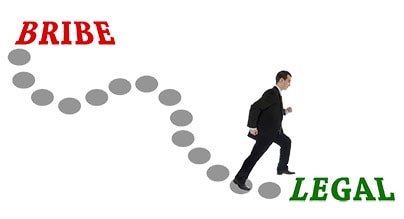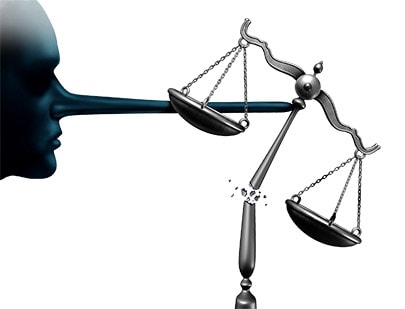Article on Anti Bribery & Anti Corruption Law in the United Kingdom
“In these times, a great leader must be extremely brave. Their leadership must be steered only by their conscience, not a bribe.” – Suzy Kassem
 This article sets out brief summaries of the United Kingdom (UK) Anti Bribery &Corruption law and emphasizes the significance of the compliance of provisions by individuals, Businessmen, professionals while conducting themselves.
This article sets out brief summaries of the United Kingdom (UK) Anti Bribery &Corruption law and emphasizes the significance of the compliance of provisions by individuals, Businessmen, professionals while conducting themselves.
The main legislation in the UK governing bribery & corruption is Bribery Act, 2010 which came into force on 1 July 2011. This act is basically a consolidated scheme of bribery offences to cover bribery in the U.K & abroad. The act defines criminal offence of bribing another person, public official, being bribed & liability of commercial organisations to prevent offence of bribery. The act has the extraterritorial jurisdiction meaning thereby that a person who is a citizen of the UK or a resident of UK would be held liable for the offence of bribery under this Act irrespective of the place of the offence. Likewise, a body incorporated under the U.K law would be liable under the act if the offence of bribery is committed by it while operating in the UK or elsewhere. A maximum penalty of 10 years or an unlimited fine or both has been incorporated for all the offences except offences under section 7 of the Act relating to the prevention of the offence of bribery by commercial organisations which carry the punishment of an unlimited fine.
The principal bribery offences:
Sections 1, 2 & 6 of the Act deal with the offence of bribing, being bribed and bribing foreign public official respectively. In common parlance, Bribery means when a person gives money to another person for some financial advantage to him or his relation. In legal terms as in the Act, Bribery has been defined in wide terms. According to section 1 of the Act, a person is liable for the offence of bribery when he offers, promises or gives a financial advantage to another person for the purpose of improper performance of relevant function or activity on latter’s part. It is not necessary that offence should be completed, merely offering a bribe to another person makes the person liable under the definition. Similarly, a person would be held liable whether the offence is committed by him directly or through someone else.
It is not imperative that the person to whom bribe has been offered has to engage in improper performance of a relevant function or activity meaning thereby that offeror of the bribe would still be held responsible even if it is performed by someone else.
 As per Section 2 of the Act, a person is liable for the offence of bribery when he requests, agrees to receive or accepts financial advantage or other in relation to improper performance of a relevant function or activity. A person would be held liable for the offence under this section whether the advantage is for himself or for somebody else. Similarly, he would be responsible whether he undertakes upon himself to perform of relevant function or activity improperly or engages someone else.
As per Section 2 of the Act, a person is liable for the offence of bribery when he requests, agrees to receive or accepts financial advantage or other in relation to improper performance of a relevant function or activity. A person would be held liable for the offence under this section whether the advantage is for himself or for somebody else. Similarly, he would be responsible whether he undertakes upon himself to perform of relevant function or activity improperly or engages someone else.
Section 6 creates a distinct offence of bribery of a foreign public official. A person commits offence under this section if he offers, promises or gives any financial or other advantages to a foreign public official with the following intention:
- to influence the Public official in the performance of his/her functions as a public official and
- to obtain/retain business or advantage in the conduct of the business.
In this section, a bribe may be offered by the person himself or through a third party and likewise, the advantage may be for the recipient himself or for some other person on the latter’s request.
This section makes it clear that mere offering/promising of a bribe to a Foreign public official makes a person liable meaning that acceptance on the part of a public official is not necessary, subject to the following two conditions:
- Such official should not be permitted/required by the applicable written law to be influenced by the financial or other advantages (offence under this section is not committed if he is permitted to be influenced by written law).
- Above mentioned two intentions on the part of the person offering the bribe must be proved.
Foreign Public Official as per sub-section 5 of the act includes officials whether elected or appointed who hold the legislative, administrative or judicial position of any kind of a country or territory outside the UK or an official who performs a public function within such country/territory. It also includes officials of Public International Organisations.
Written law applicable to the foreign public official is that part of U.K Law to which he is subject and if UK Law does not apply to him, the law of the country (in any written form) in relation to which he is such official would be applicable. If he is an agent of Public International Organisation, the rules of such an organisation would be applicable as per subsection 7.
Improper performance of function or activity to which bribe relates:
As defined above, Bribe is when a person offers a financial advantage to another person for doing an improper performance of a function or activity. Section 3 to 5 deals with the same. Function or activity to which bribe relates include all functions of public nature and all activities connected with business, trade or profession carried out either in the UK or abroad, and need have no connection with the UK as per Section 3 of the Act.
Now the question arises how the improper performance of the function or activity would be judged? The answer lies in the Expectation Test described as under:
Subjective test or Expectation Test is what would a reasonable person in the United Kingdom would expect in relation to the performance of function/activity. If the performance of any act by a person does not meet the expectation test, performance would be held improper as per section 5 of the Act.
Further Section 5 clarifies that the performance of a concerned person in relation to function or activity expected by a reasonable person should be subject to any part of UK Law. Any local custom or practice in this regard is to be disregarded unless permitted/required by written law applicable to the country.
Responsibility of Commercial organisations to prevent bribery.
Commercial organisations include a body incorporated or partnership firm formed under the law of the UK carrying on business in the UK or somewhere else, or a body incorporated, or partnership formed somewhere else but carrying on their business in the UK.
Commercial organisations would be liable for any improper performance of a function or activity committed by a person who is associated with them as an employee, agent or subsidiary as per section 7 of the act which embodies the principle of Vicarious liability.
Section 15 of the act deals with proceedings for an offence against a partnership under Section 7. Such proceedings must be brought in the name of the partnership and any fine imposed on the partnership on the conviction must be paid out of the partnership assets as per subsection 3.
Defences for bribery offences
Section 7 & 13 deals with the defence available to commercial organisations and persons respectively.
The only defence which is available with the organisation under section 7 (2) is that it had adequate procedures in place to prevent such person associated with it from committing bribery offences.
On the other hand, within Section 13, two defences are available to the person (charged with the bribery offence) if his conduct is necessary for:
- the proper exercise of any function of Intelligence Service or
- the proper exercise of any function of armed forces when engaged in active service.
Guidance about Commercial Organisations to prevent bribery
As per Section 9 of the act, duty has been imposed on Secretary of State to publish guidelines on procedures to be adopted by the organisations to prevent bribery by the persons associated with them.
Prosecution
According to section 10, prosecution for the offences under this act is initiated in the UK with the consent of one of the directors of the Department of Public Prosecution or Serious Fraud Office or Revenue and Customs Prosecution.
Penalties
Section 11 of the act deals with it. Any individual who is guilty of an offence under sections 1, 2 or 6 is liable for imprisonment not exceeding 12 months or to a fine up to statutory maximum or both upon summary conviction and in the cases of conviction on indictment for imprisonment not exceeding 10 years or an unlimited fine or both.
On the other hand, under section 7 in the cases of conviction on indictment, a person is liable to a fine only.
Offences under sections 1, 2 or 6 by bodies corporate etc.
Under Section 14 if it is proved that any offence mentioned within sections 1, 2 or 6 is committed either by body corporate or partnership, the senior officer, director of such body or partner would also hold liable subject to the following two conditions:
- He has consented to or connived in the commission of the offence and
- He must have a close connection to the U.K as defined in section 12(4).
Conclusion
From a legal perspective, Bribery Act 2010, has been defined widely by covering all the persons who have a link to the United Kingdom or even if they have no connection to the UK, they still are held liable if they engage in a conspiracy to commit bribery with a person who is in the UK.
 In the end, it could be said that in addition to violating legal and moral codes, bribery poses serious problems for economic development and international trade. Fostering a culture within the organisation to prevent the bribery is need of the hour. Due diligence procedures should be in place within the organisation to mitigate bribery risks. Along with it, the organisation should monitor and review procedures designed to prevent bribery and make improvements wherever necessary.
In the end, it could be said that in addition to violating legal and moral codes, bribery poses serious problems for economic development and international trade. Fostering a culture within the organisation to prevent the bribery is need of the hour. Due diligence procedures should be in place within the organisation to mitigate bribery risks. Along with it, the organisation should monitor and review procedures designed to prevent bribery and make improvements wherever necessary.
 Русский
Русский
 English
English 官话
官话 português
português عربي
عربي
 Türk
Türk 






.jpg)

















